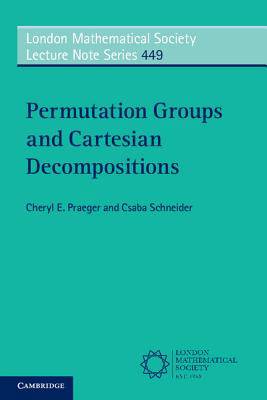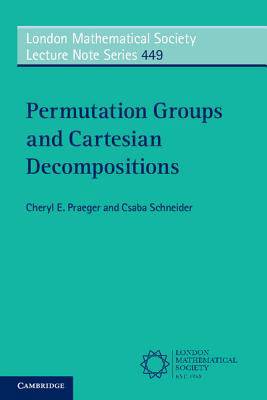
Je cadeautjes zeker op tijd in huis hebben voor de feestdagen? Kom langs in onze winkels en vind het perfecte geschenk!
- Afhalen na 1 uur in een winkel met voorraad
- Gratis thuislevering in België vanaf € 30
- Ruim aanbod met 7 miljoen producten
Je cadeautjes zeker op tijd in huis hebben voor de feestdagen? Kom langs in onze winkels en vind het perfecte geschenk!
- Afhalen na 1 uur in een winkel met voorraad
- Gratis thuislevering in België vanaf € 30
- Ruim aanbod met 7 miljoen producten
Zoeken
€ 145,95
+ 291 punten
Omschrijving
Permutation groups, their fundamental theory and applications are discussed in this introductory book. It focuses on those groups that are most useful for studying symmetric structures such as graphs, codes and designs. Modern treatments of the O'Nan-Scott theory are presented not only for primitive permutation groups but also for the larger families of quasiprimitive and innately transitive groups, including several classes of infinite permutation groups. Their precision is sharpened by the introduction of a cartesian decomposition concept. This facilitates reduction arguments for primitive groups analogous to those, using orbits and partitions, that reduce problems about general permutation groups to primitive groups. The results are particularly powerful for finite groups, where the finite simple group classification is invoked. Applications are given in algebra and combinatorics to group actions that preserve cartesian product structures. Students and researchers with an interest in mathematical symmetry will find the book enjoyable and useful.
Specificaties
Betrokkenen
- Auteur(s):
- Uitgeverij:
Inhoud
- Aantal bladzijden:
- 334
- Taal:
- Engels
- Reeks:
- Reeksnummer:
- nr. 449
Eigenschappen
- Productcode (EAN):
- 9780521675062
- Verschijningsdatum:
- 3/05/2018
- Uitvoering:
- Paperback
- Formaat:
- Trade paperback (VS)
- Afmetingen:
- 151 mm x 228 mm
- Gewicht:
- 503 g

Alleen bij Standaard Boekhandel
+ 291 punten op je klantenkaart van Standaard Boekhandel
Beoordelingen
We publiceren alleen reviews die voldoen aan de voorwaarden voor reviews. Bekijk onze voorwaarden voor reviews.









